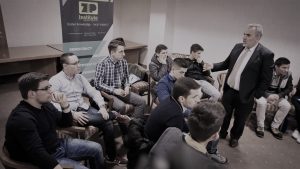Skopje’s capital Macedonia is in many ways a divided city, split between its two dominant ethnic groups: Macedonians, who are Slavs, and ethnic Albanians, many of whom are Muslim. The high schools educating the country’s future religious leaders — Christian Orthodox and Muslim — rarely, if ever, interact one another. The geographical landscape of Skopje means that though it is the same city, the schools — and the students — are far apart, some 40 minutes by car with no traffic, to be exact.
The Partnership for Actions for Cohabitation and Tolerance (PACT) is one of the Resonant Voices-sponsored pilot projects that has contributed to bridging the religious, linguistic and geographical divide. PACT is an initiative of the Skopje-base ZIP Institute that brings together high school students studying to be future Christian Orthodox and Muslim religious leaders to share their perspectives on the issues of the day.
“Religion is a sensitive topic in Macedonia,” says Jovana Perovska, who worked on the project. “The question of ethno-religious and national identity causes a lot of division here, because unlike, for example, countries like Bosnia and Herzegovina in which you have language as a common denominator, here [between ethnic Macedonians and Albanians] you have different ethnic identities, different national identities to an extent, different religious identities and a different linguistic identity.”
For that reason, PACT decided to bring together students who study theology from Christian and Islamic high schools for a workshop to “open a dialogue and see how similar or different they are on issues important in Macedonia,” Perovska says.
It was perhaps not their first time interacting with a person of the other ethnicity, says Perovska. “It happens every day in the bus, at the supermarket, but it is the first time that many of them had extended contact, I would say.” The students at the religious high schools are particularly sheltered, because their institutions are boarding schools where they have classes six days per week, confining them largely to their own communities.
Under the guidance of facilitator Ali Pajaziti, chosen in part because of his ability to communicate with the group in both Albanian and Macedonian, the young students held discussions about issues ranging from social cohesion to abortion, women’s rights to education, and it was fascinating to see the wide range of opinions represented even in the groups of pupils studying at the same institution. Owing either to their discipline from school, or more likely their interest in the discussions, participants were totally engaged, says Perovska.

Usually at workshops, especially ones where participants are in a conference room for eight hours a day, eventually people turn to their mobile phones for entertainment, she says. “Everyone ends up on their phones, scrolling. I do it myself at academic conferences, debates, workshops. But not this time. It was amazing to see the level of attention they paid.”
But at the end of the day, everyone had their phones out.
“At the end of the training people came around saying ‘Hey bro, can you add me on Instagram?’ Or, ‘Hey bro, can you add me on Facebook?’” says Perovska. “That really did it for me because these people have never met each other before, these people have never been exposed to each other. Even if adding someone on Facebook or Instagram does not provide an in-depth glimpse into someone’s life and someone’s community, it will provide exposure between these people.”
The future Islamic scholars also brought copies of the Qur’an, translated into Macedonian, and gave them to all of the participants.
PACT received so much appreciation from the high schoolers’ professors that they know this project must continue, and ZIP is already making plans to scale it up. One of the obstacles is the fact that though there are madrassas across Macedonia, there is only one Orthodox high school of its kind. PACT is also keen to involve young women, but because unlike the madrassas, there are no female students at the Orthodox high school, the pilot phase was limited to male students. The current plan is to try to expand the project to the university level, with the assistance of the Orthodox and Islamic religious communities.
The Partnership for Actions for Cohabitation and Tolerance (PACT) project by ZIP Institute received seed funding and mentoring support from the Resonant Voices Initiative
